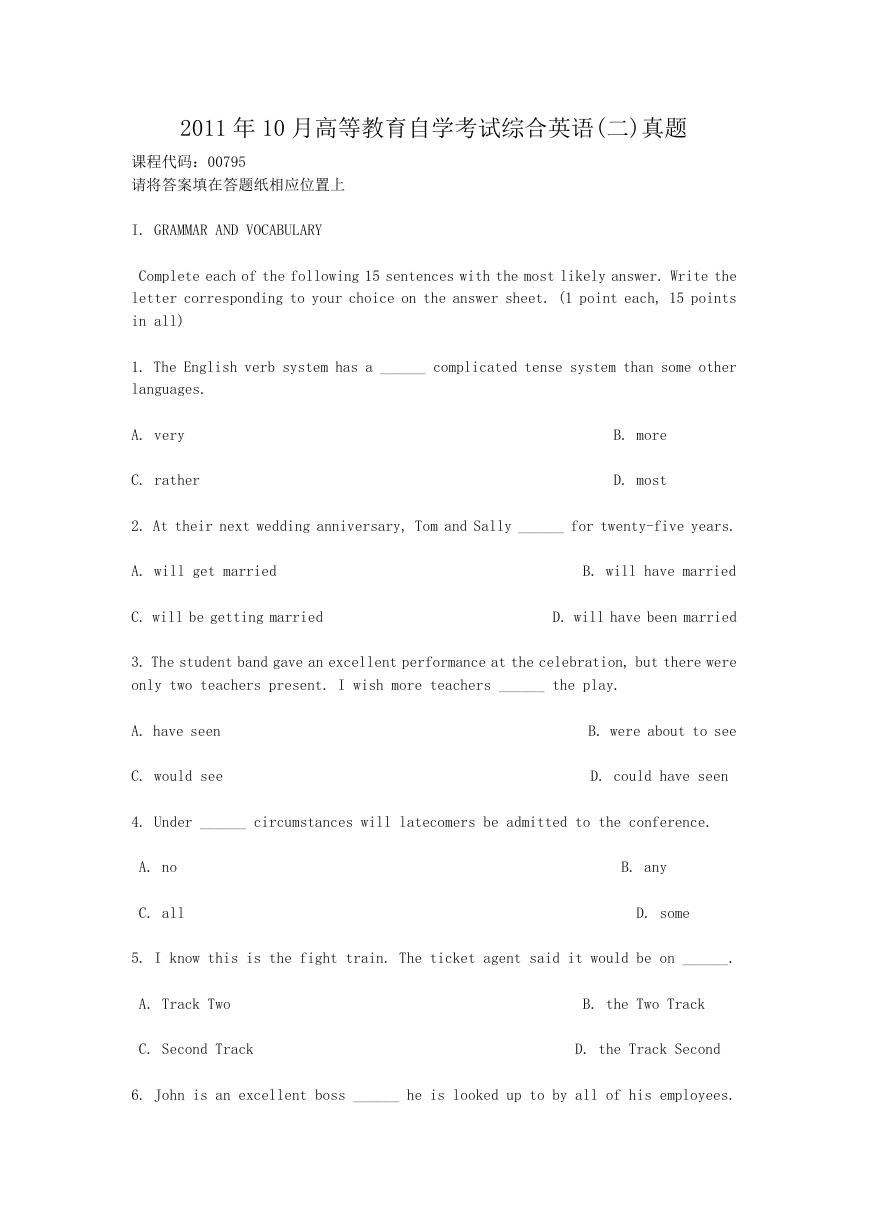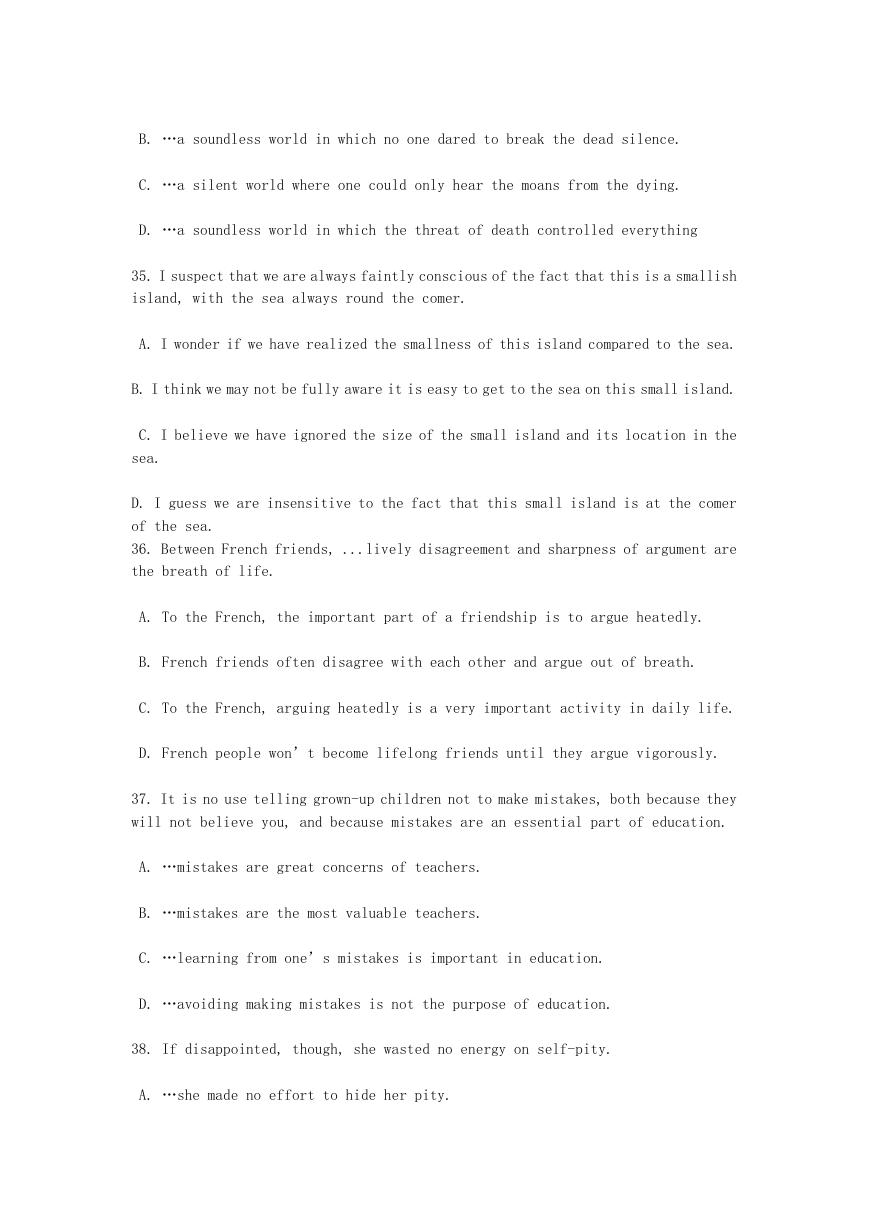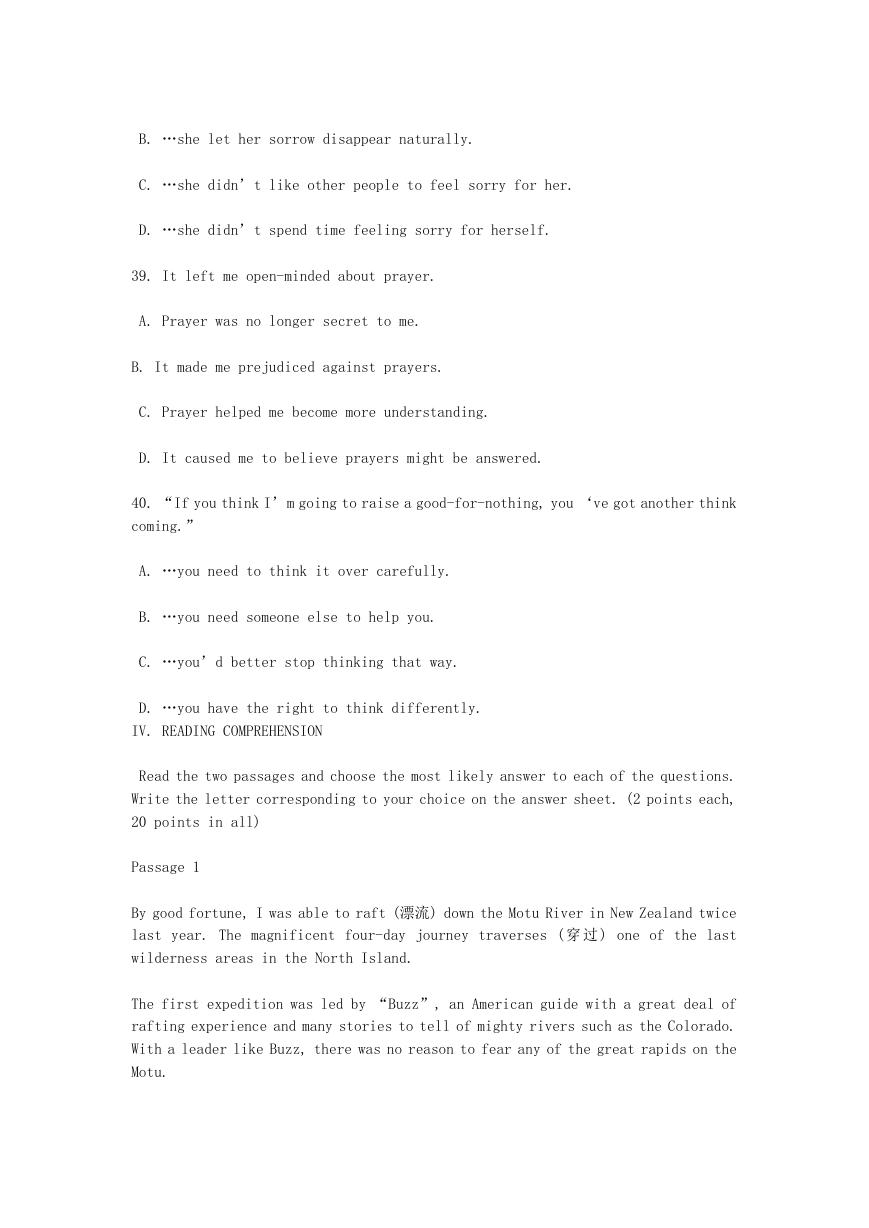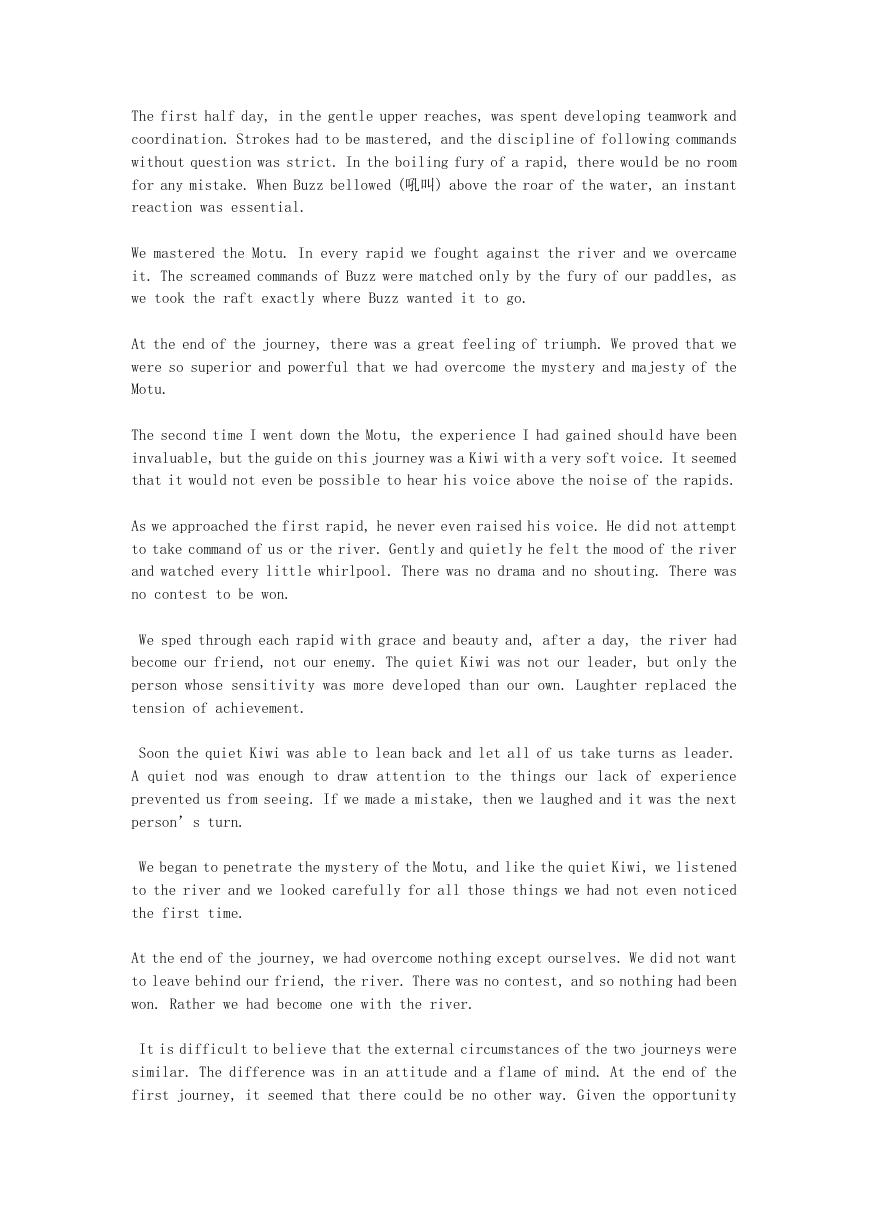2011 年 10 月高等教育自学考试综合英语(二)真题
课程代码:00795
请将答案填在答题纸相应位置上
I. GRAMMAR AND VOCABULARY
Complete each of the following 15 sentences with the most likely answer. Write the
letter corresponding to your choice on the answer sheet. (1 point each, 15 points
in all)
1. The English verb system has a ______ complicated tense system than some other
languages.
A. very
C. rather
B. more
D. most
2. At their next wedding anniversary, Tom and Sally ______ for twenty-five years.
A. will get married
B. will have married
C. will be getting married
D. will have been married
3. The student band gave an excellent performance at the celebration, but there were
only two teachers present. I wish more teachers ______ the play.
A. have seen
C. would see
B. were about to see
D. could have seen
4. Under ______ circumstances will latecomers be admitted to the conference.
A. no
C. all
B. any
D. some
5. I know this is the fight train. The ticket agent said it would be on ______.
A. Track Two
C. Second Track
B. the Two Track
D. the Track Second
6. John is an excellent boss ______ he is looked up to by all of his employees.
�
A. but
C. while
B. and
D. or
7. We don’t really know who broke ______ Tommy’s house last night.
A. out
C. into
B. down
D. through
8. The course normally attracts 50 students per year, ______ up to half are from
overseas.
A. of them
C. of those
B. of whom
D. of which
9. John strongly disagreed with the arbitrary ______ made by the board of directors,
so he resigned from the board.
A. permission
C. discussion
B. conclusion
D. decision
10. As soon as the conference was over, all the participants went back to their ______
workplaces.
A. relative
C. perspective
B. selective
D. respective
11. You can’t leave your daughter home ______ because she is only six years old.
A. alone
C. lonely
12. It is my own ______ if I am cheated by the same man twice.
A. guilt
C. fault
B. single
D. separate
B. error
D. defect
�
13. The outdoor celebration has been ______ till next week due to the awful weather.
A. put off
C. shut off
B. pulled off
D. turned off
14. Neither Cathy nor Susan replied. Linda was angry and ______ at them both for
not answering her question.
A. glanced
C. glimpsed
B. gazed
D. glared
15. In a job interview, it is ______ necessary for an applicant to prepare for some
questions relevant to his or her career plan.
A. openly
C. visibly
II. CLOZE
B. noticeably
D. obviously
Fill in each of the 15 blanks in the passage with the most likely answer. Write the
letter corresponding to your choice on the answer sheet. (1 point each, 15 points
in all)
Babies love a beat, according to a new study that found dancing comes naturally to
infants. The research showed babies respond to the rhythm of
, and find it
a study of 120 infants
more interesting than speech. The findings, based
18
between five months and two years old, suggest that humans may be born with a
to move rhythmically in response to music. Researchers find that it is the beat
19
other features of the music, such as the melody,
produces the response in
infants. They
found that the better the children’s movements were able to
coincide with the music, the more they smiled.
16
17
20
21
22
recordings of classical
To test babies’ reaction to music, the researchers
In addition,
music, rhythmic beats and speech to infants, and videotaped the
they recruited professional ballet dancers to analyze how well the babies
24
their movements to the music. During the experiments, each baby was sitting on a
parent’s lap. The adults had
on to make sure they couldn’t hear the music,
and they were
not to move. The researchers found the babies moved their arms,
hands, legs, feet and heads in response to the music,
than to speech.
23
25
26
27
It
28
reaction. One
possibility is that it was a target of natural selection for music or that it has
to be understood why humans have developed this
29
�
30
function that just happens to be relevant to music processing.
evolved for
Though the ability appears to be innate in humans, the researchers aren’t sure why
it evolved.
16. A. voice
dance
17. A. in
D. to
18. A. custom
behaviour
19. A. rather than
than
20. A. what
D. that
21. A. still
D. only
B. movement
C. music
D.
B. on
C. at
B. character
C. tendency
D.
B. other than
C. more than
D. less
B. which
C. it
B. also
C. just
22. A. composed
B. performed
C. played
D. set
23. A. consequences
B. results
C. information
D. data
24. A. suited
matched
B. directed
C. balanced
D.
25. A. headphones
B. masks
C. microphones
D. glasses
26. A. controlled
confined
B. instructed
C. limited
D.
27. A. much more
B. much fewer
C. no more
D. no less
28. A. keeps
D. remains
29. A. certain
characteristic
30. A. some other
other
B. leaves
C. stays
B. particular
C. unusual
D.
B. the other
C. one another
D. each
�
III. PARAPHRASING
Choose the closest paraphrased version after each of the following sentences or the
italicized part. Write the letter corresponding to your choice on the answer sheet.
(1 point each, 10 points in all)
31. We want every minute to count.
A. The minute is the basic unit of our lifetime.
B. Every minute should be precisely measured.
C. We want to make use of every minute effectively.
D. Everyone should be aware of the limit of his lifetime.
32. Culture shock is caused by the anxiety that results from losing all our familiar
signs and symbols of social intercourse.
A. that may lead people to misunderstand the unfamiliar behaviour.
B. that may make people feel lost in a completely new environment.
C. people have when they are not used to the new ways of communication.
D. people have when they do not know the rules and laws in a new place.
33. This washwoman, small and thin as she was, possessed a strength that came from
generations of peasant ancestors.
A. Unlike her peasant ancestors, this small thin washwoman was born strong.
B. This washwoman, like her peasant ancestors, was small and thin but strong.
C. With the strength from her peasant ancestors, the washwoman was still small and
thin.
D. The washwoman was small and thin, but she inherited the strength of her peasant
ancestors.
34. Kaz Tanaka had wakened in a frightening new world—a world whose dominant sound
was a silence broken only by the cries of the dying.
A. …a silent world where one could do nothing but make dying cries.
�
B. …a soundless world in which no one dared to break the dead silence.
C. …a silent world where one could only hear the moans from the dying.
D. …a soundless world in which the threat of death controlled everything
35. I suspect that we are always faintly conscious of the fact that this is a smallish
island, with the sea always round the comer.
A. I wonder if we have realized the smallness of this island compared to the sea.
B. I think we may not be fully aware it is easy to get to the sea on this small island.
C. I believe we have ignored the size of the small island and its location in the
sea.
D. I guess we are insensitive to the fact that this small island is at the comer
of the sea.
36. Between French friends, ...lively disagreement and sharpness of argument are
the breath of life.
A. To the French, the important part of a friendship is to argue heatedly.
B. French friends often disagree with each other and argue out of breath.
C. To the French, arguing heatedly is a very important activity in daily life.
D. French people won’t become lifelong friends until they argue vigorously.
37. It is no use telling grown-up children not to make mistakes, both because they
will not believe you, and because mistakes are an essential part of education.
A. …mistakes are great concerns of teachers.
B. …mistakes are the most valuable teachers.
C. …learning from one’s mistakes is important in education.
D. …avoiding making mistakes is not the purpose of education.
38. If disappointed, though, she wasted no energy on self-pity.
A. …she made no effort to hide her pity.
�
B. …she let her sorrow disappear naturally.
C. …she didn’t like other people to feel sorry for her.
D. …she didn’t spend time feeling sorry for herself.
39. It left me open-minded about prayer.
A. Prayer was no longer secret to me.
B. It made me prejudiced against prayers.
C. Prayer helped me become more understanding.
D. It caused me to believe prayers might be answered.
40. “If you think I’m going to raise a good-for-nothing, you ‘ve got another think
coming.”
A. …you need to think it over carefully.
B. …you need someone else to help you.
C. …you’d better stop thinking that way.
D. …you have the right to think differently.
IV. READING COMPREHENSION
Read the two passages and choose the most likely answer to each of the questions.
Write the letter corresponding to your choice on the answer sheet. (2 points each,
20 points in all)
Passage 1
By good fortune, I was able to raft (漂流) down the Motu River in New Zealand twice
last year. The magnificent four-day journey traverses ( 穿 过 ) one of the last
wilderness areas in the North Island.
The first expedition was led by “Buzz”, an American guide with a great deal of
rafting experience and many stories to tell of mighty rivers such as the Colorado.
With a leader like Buzz, there was no reason to fear any of the great rapids on the
Motu.
�
The first half day, in the gentle upper reaches, was spent developing teamwork and
coordination. Strokes had to be mastered, and the discipline of following commands
without question was strict. In the boiling fury of a rapid, there would be no room
for any mistake. When Buzz bellowed (吼叫) above the roar of the water, an instant
reaction was essential.
We mastered the Motu. In every rapid we fought against the river and we overcame
it. The screamed commands of Buzz were matched only by the fury of our paddles, as
we took the raft exactly where Buzz wanted it to go.
At the end of the journey, there was a great feeling of triumph. We proved that we
were so superior and powerful that we had overcome the mystery and majesty of the
Motu.
The second time I went down the Motu, the experience I had gained should have been
invaluable, but the guide on this journey was a Kiwi with a very soft voice. It seemed
that it would not even be possible to hear his voice above the noise of the rapids.
As we approached the first rapid, he never even raised his voice. He did not attempt
to take command of us or the river. Gently and quietly he felt the mood of the river
and watched every little whirlpool. There was no drama and no shouting. There was
no contest to be won.
We sped through each rapid with grace and beauty and, after a day, the river had
become our friend, not our enemy. The quiet Kiwi was not our leader, but only the
person whose sensitivity was more developed than our own. Laughter replaced the
tension of achievement.
Soon the quiet Kiwi was able to lean back and let all of us take turns as leader.
A quiet nod was enough to draw attention to the things our lack of experience
prevented us from seeing. If we made a mistake, then we laughed and it was the next
person’s turn.
We began to penetrate the mystery of the Motu, and like the quiet Kiwi, we listened
to the river and we looked carefully for all those things we had not even noticed
the first time.
At the end of the journey, we had overcome nothing except ourselves. We did not want
to leave behind our friend, the river. There was no contest, and so nothing had been
won. Rather we had become one with the river.
It is difficult to believe that the external circumstances of the two journeys were
similar. The difference was in an attitude and a flame of mind. At the end of the
first journey, it seemed that there could be no other way. Given the opportunity
�
















 2023年江西萍乡中考道德与法治真题及答案.doc
2023年江西萍乡中考道德与法治真题及答案.doc 2012年重庆南川中考生物真题及答案.doc
2012年重庆南川中考生物真题及答案.doc 2013年江西师范大学地理学综合及文艺理论基础考研真题.doc
2013年江西师范大学地理学综合及文艺理论基础考研真题.doc 2020年四川甘孜小升初语文真题及答案I卷.doc
2020年四川甘孜小升初语文真题及答案I卷.doc 2020年注册岩土工程师专业基础考试真题及答案.doc
2020年注册岩土工程师专业基础考试真题及答案.doc 2023-2024学年福建省厦门市九年级上学期数学月考试题及答案.doc
2023-2024学年福建省厦门市九年级上学期数学月考试题及答案.doc 2021-2022学年辽宁省沈阳市大东区九年级上学期语文期末试题及答案.doc
2021-2022学年辽宁省沈阳市大东区九年级上学期语文期末试题及答案.doc 2022-2023学年北京东城区初三第一学期物理期末试卷及答案.doc
2022-2023学年北京东城区初三第一学期物理期末试卷及答案.doc 2018上半年江西教师资格初中地理学科知识与教学能力真题及答案.doc
2018上半年江西教师资格初中地理学科知识与教学能力真题及答案.doc 2012年河北国家公务员申论考试真题及答案-省级.doc
2012年河北国家公务员申论考试真题及答案-省级.doc 2020-2021学年江苏省扬州市江都区邵樊片九年级上学期数学第一次质量检测试题及答案.doc
2020-2021学年江苏省扬州市江都区邵樊片九年级上学期数学第一次质量检测试题及答案.doc 2022下半年黑龙江教师资格证中学综合素质真题及答案.doc
2022下半年黑龙江教师资格证中学综合素质真题及答案.doc